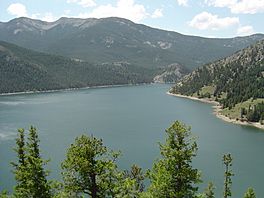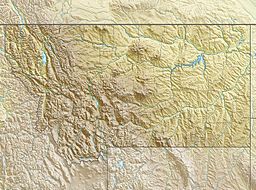Gibson Reservoir facts for kids
Quick facts for kids Gibson Reservoir |
|
|---|---|
 |
|
| Location | Teton County & Lewis & Clark County, Montana, United States |
| Coordinates | 47°36′12″N 112°45′39″W / 47.60333°N 112.76083°W |
| Type | Reservoir |
| Primary inflows | South Fork Sun River North Fork Sun River |
| Primary outflows | Sun River |
| Built | 1926-1929 |
| Max. length | 4.5 miles (7.2 km) |
| Max. width | 3,500 feet (1,100 m) |
| Surface area | 1,288.8 acres (521.6 ha) |
| Max. depth | 123 feet (37 m) |
| Water volume | 96,477 acre-feet (119,003,000 m3) |
| Surface elevation | 4,869 feet (1,484 m) |
Gibson Reservoir is a special kind of lake in Montana, USA. It's not a natural lake, but a man-made one, also called a reservoir. It was created to help manage water for nearby farms and communities.
This reservoir is found in the western part of Montana. It sits just south of the Bob Marshall Wilderness, a large area of protected land. It's also about 20 miles (32 km) northwest of a town called Augusta.
Gibson Reservoir is unique because it forms part of the border between two counties: Teton County and Lewis & Clark County.
Contents
How Gibson Reservoir Was Made
Gibson Reservoir was created by building a large structure called the Gibson Dam. This dam is made of concrete and acts like a giant wall. It holds back the water, forming the reservoir behind it.
The dam was built a long time ago, between 1926 and 1929. It stretches across a hilly area, creating a lake that is about 3 miles (4.8 km) long.
Where Does the Water Come From?
The water that fills Gibson Reservoir mainly comes from melting snow in the spring. This melted snow turns into water that flows into rivers.
Two main rivers feed the reservoir: the North Fork Sun River and the South Fork Sun River. These two rivers join together, and their water then flows into the reservoir.
Why Gibson Reservoir is Important
The main reason Gibson Reservoir was built is for irrigation control. Irrigation is a way to supply water to crops and fields, especially in dry areas.
The reservoir stores a lot of water, which can then be released when farmers need it for their crops. This helps make sure that farms have enough water to grow food, even when there isn't much rain.
Size and Features
Gibson Reservoir is quite large. It covers an area of about 1,288 acres (521 hectares). That's like more than 975 football fields!
At its deepest point, the reservoir goes down about 123 feet (37 meters). It holds a huge amount of water, about 96,477 acre-feet. An acre-foot is the amount of water needed to cover one acre of land with water one foot deep.
 | Tommie Smith |
 | Simone Manuel |
 | Shani Davis |
 | Simone Biles |
 | Alice Coachman |


